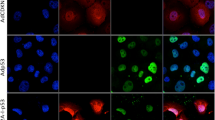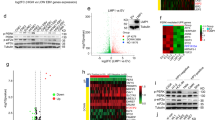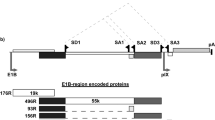Abstract
The p16INK4 tumor suppressor gene encodes a protein that inhibits cyclin-dependent kinase 4, and its homologous deletion is common in human breast cancer. p16INK4 gene transfer has been reported to be efficacious in inducing growth inhibition of various human tumors such as brain, lung, prostate, and esophageal cancers. However, the efficiency of the p16INK4 gene with regard to growth inhibition of human breast cancer has not been studied extensively. To examine its tumor-suppressive function and its potential in breast cancer gene therapy, the wild-type p16INK4 gene was expressed in an adenovirus-mediated gene delivery system and introduced into breast cancer cell lines that do not express p16INK4 protein. Expression of the introduced p16INK4 blocked tumor cell entry into the S phase of the cell cycle, induced tumor cell apoptosis, and inhibited tumor cell proliferation both in vitro and in vivo. These results strongly suggest that p16INK4 is a tumor suppressor gene and suggest that it has potential utility in breast cancer gene therapy.
This is a preview of subscription content, access via your institution
Access options
Subscribe to this journal
Receive 12 print issues and online access
$259.00 per year
only $21.58 per issue
Buy this article
- Purchase on Springer Link
- Instant access to full article PDF
Prices may be subject to local taxes which are calculated during checkout
Similar content being viewed by others
Author information
Authors and Affiliations
Corresponding author
Rights and permissions
About this article
Cite this article
Campbell, I., Magliocco, A., Moyana, T. et al. Adenovirus-mediated p16INK4 gene transfer significantly suppresses human breast cancer growth. Cancer Gene Ther 7, 1270–1278 (2000). https://doi.org/10.1038/sj.cgt.7700226
Received:
Accepted:
Published:
Issue Date:
DOI: https://doi.org/10.1038/sj.cgt.7700226
Keywords
This article is cited by
-
Transgene expression of α tumor necrosis factor with mutations D142N and A144R under control of human telomerase reverse transcriptase promoter eradicates well-established tumors and induces long-term antitumor immunity
Cancer Gene Therapy (2009)
-
Gene therapy for carcinoma of the breast
Cancer Gene Therapy (2006)
-
Combinational adenovirus-mediated gene therapy and dendritic cell vaccine in combating well-established tumors
Cell Research (2006)
-
The tumor suppressor p16INK4a prevents cell transformation through inhibition of c-Jun phosphorylation and AP-1 activity
Nature Structural & Molecular Biology (2005)
-
RETRACTED ARTICLE: Genetic alterations of the NRP/B gene are associated with human brain tumors
Oncogene (2004)



